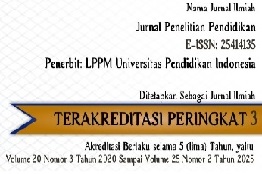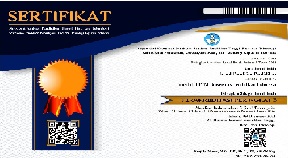Cloud Class dan Cloud Meeting; Model Pembelajaran Pascasarjana dan Meeting Pimpinan
Abstract
Memilih untuk melanjutkan sekolah ke pascasarjana menjadi keputusan yang tidak mudah, dimana banyak faktor yang harus dipertimbangkan, yang utama dan terpenting adalah masalah biaya dan alokasi waktu. Kenapa demikian karena hampir 80% mahasiswa pascasarjana sudah menjadi pegawai di berbagai instansi, dan pasarannya mencakup seluruh nusantara, sehingga jika memilih sekolah maka banyak kegiatan yang harus ditinggalkan. Salah satu alternative pemecahan masalah ini untuk win-win solution adalah dengan mulai membangung cloud class, dimana dengan program ini, maka efektifitas dan efisiensi sumber daya yang digunakan untuk menlajutkan sekolah dapat ditekan seminimal mungkin. Demikian juga karena UPI memiliki beberapa UPI Kampus Daerah, maka ketika diperlukan untuk rapat pimpinan yang mengharuskan semua pimpinan atau undangan dalam kegiatan apapun memerlukan sumber dana yang tidak sedikit, demikian juga waktu karena jarak yang jauh, solusi dari hal tersebut dengan menggunakan cloud meeting sehingga sumber daya yang dikeluarkan untuk mengikuti rapat ditekan seminimal mungkin. Maka dengan demikian penelitian ini sangat tepat untuk dilaksanakan.
Keywords
Full Text:
PDFReferences
Alaloul, W. S., Liew, M. S., Zawawi, N. A. W. A., & Mohammed, B. S. (2018). Industry Revolution IR 4.0: Future Opportunities and Challenges in Construction Industry. MATEC Web of Conferences, 203, 1–7. https://doi.org/10.1051/matecconf/201820302010
Allam, Z., & Dhunny, Z. A. (2019). On big data, artificial intelligence and smart cities. Cities, 89(January), 80–91. https://doi.org/10.1016/j.cities.2019.01.032
Demangeon, A., B., E. A., & Low, E. F. (1925). The British Empire: A Study in Colonial Geography. The Geographical Journal, 66(4), 372. https://doi.org/10.2307/1782970
Barnes, R., Hall, R., Lowe, V., Pottinger, C., & Popham, A. (2020). Lessons from an online teacher preparation Program: flexing work experience to meet student needs and regulators’ requirements in the United States. Journal of Education for Teaching, 00(00), 1–8. https://doi.org/10.1080/02607476.2020.1802203
Baturay, M. H. (2015). An Overview of the World of MOOCs. Procedia - Social and Behavioral Sciences, 174, 427–433. https://doi.org/10.1016/j.sbspro.2015.01.685
Benoit Rihoux, H. G. (2006). Inovative Comparative Methods for Policy Analysis.
Brown, M. (2018). The 2018 OpenupEd T rend R eport on MOOCs, (July).
China State Council, & Foundation for Law and International Affairs. (2017). New Generation of Artificial Intelligence Development Plan, 1–28. Retrieved from https://flia.org/notice-state-council-issuing-new-generation-artificial-intelligence-development-plan/
Gaffar, F. E. P. (2020). Implementasi Kebijakan.
Franco, Y. C. E., Nigmonova, D., & Panichpathom, W. (2014). DeMOOCratization of Education?: Massive Open Online Courses ( MOOCs ) and the opportunities and challenges for developing countries. Graduate Institute of International and Development Studies, Geneva, Switzerland, 1–84.
Heyang, T., & Martin, R. (2020). A reimagined world: international tertiary dance education in light of COVID-19. Research in Dance Education, 00(00), 1–15. https://doi.org/10.1080/14647893.2020.1780206
Holstein, S., & Cohen, A. (2016). The Characteristics of Successful MOOCs in the Fields of Software, Science, and Management, According to Students’ Perception. Interdisciplinary Journal of E-Skills and Lifelong Learning, 12, 247–266. https://doi.org/10.28945/3614
Murphy, M. P. A. (2020). COVID-19 and emergency eLearning: Consequences of the securitization of higher education for post-pandemic pedagogy. Contemporary Security Policy, 41(3), 492–505. https://doi.org/10.1080/13523260.2020.1761749
Nagy, J., Oláh, J., Erdei, E., Máté, D., & Popp, J. (2018). The role and impact of industry 4.0 and the internet of things on the business strategy of the value chain-the case of hungary. Sustainability (Switzerland), 10(10). https://doi.org/10.3390/su10103491
OECD. (2019). Artificial Intelligence in Society. Artificial Intelligence in Society. https://doi.org/10.1787/eedfee77-en
Olazabalaga, M. I., Garrido, C. C., & Ruiz, U. G. (2016). Research on MOOCs: Trends and methodologies. Porta Linguarum, (SI), 87–98.
OpenupEd. (2015). Definition of Massive Open Online Courses (MOOCs), (March), 1–5. Retrieved from https://www.openuped.eu/images/docs/Definition_Massive_Open_Online_Courses.pdf
Organisation for Economic Co-operation and Development. (2016). The Internet of Things. Seizing the Benefits and Addressing the Challenges. OECD Digital Economy Papers, (252), 1–57. https://doi.org/10.1787/20716826
Osuwa, A. A., Ekhoragbon, E. B., & Fat, L. T. (2018). Application of artificial intelligence in Internet of Things. Proceedings - 9th International Conference on Computational Intelligence and Communication Networks, CICN 2017, 2018-Janua, 169–173. https://doi.org/10.1109/CICN.2017.8319379
Rojko, A. (2017). Industry 4.0 concept: Background and overview. International Journal of Interactive Mobile Technologies, 11(5), 77–90.
Sharfuddin, S. (2020). The world after Covid-19. Round Table, 109(3), 247–257. https://doi.org/10.1080/00358533.2020.1760498
Van De Heyde, V., & Siebrits, A. (2020). Digital laboratory report writing, assessment and feedback in the 21st century for an extended curriculum programme for physics. Research in Science and Technological Education, 00(00), 1–32. https://doi.org/10.1080/02635143.2020.1775571
Zheng, P., wang, H., Sang, Z., Zhong, R. Y., Liu, Y., Liu, C., … Xu, X. (2018). Smart manufacturing systems for Industry 4.0: Conceptual framework, scenarios, and future perspectives. Frontiers of Mechanical Engineering, 13(2), 137–150. https://doi.org/10.1007/s11465-018-0499-5
Zhong, S.-H., Zhang, Q.-B., Li, Z.-P., & Liu, Y. (2016). Motivations and Challenges in MOOCs with Eastern Insights. International Journal of Information and Education Technology, 6(12), 954–960. https://doi.org/10.7763/ijiet.2016.v6.824
DOI: https://doi.org/10.17509/jpp.v20i3.30830
Refbacks
- There are currently no refbacks.
Copyright (c) 2020 Jurnal Penelitian Pendidikan


